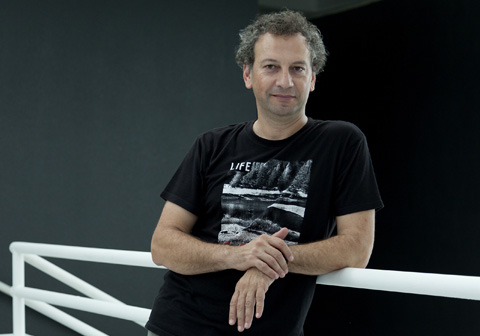A research group in the UPV/EHU's Department of Sociology 2 led by Dr Gabriel Gatti has published in the book entitled Un mundo de víctimas (A World of Victims) the result of a broad piece of research work on the extended presence of the figure of the victim and his/her centrality in Spain, and in contemporary social life in general. The study is based on four paradigmatic cases: victims of political origin, of gender violence, of traffic accidents and victims in the process of claiming the category.
Victims take centre stage
A large sociological study led by the UPV/EHU-University of the Basque Country has established that the figure of the victim has become more central in contemporary social life
First publication date: 21/07/2017

As Gabriel Gatti explained, "in recent years the figure of the victim has become more central by occupying increasingly more important spaces on the social scene and in the political, juridical, legislative and media agendas, and almost succeeds in competing with the figure of the citizen". Gatti has a PhD in sociology from the UPV/EHU and coordinates the research project Mundo(s) de víctimas. Dispositivos y procesos de construcción de la identidad de la "víctima" en la España contemporánea. Estudio de cuatro casos paradigmáticos (Victims World(s). Mechanisms and processes in the building of the identity of the "victim" in contemporary Spain. Study of four paradigmatic cases) carried out by, among others, members of the Department of Sociology 2 of the UPV/EHU's Faculty of Social and Communication Sciences.
"The victims of terrorism, of violence against women, of the Civil War, of 11-M, of Yak-42, of aircraft accidents, of Francoist repression, of the crisis, of a flood, etc. have a common denominator: the category of victim," pointed out Gatti. "A few years ago in Spain the figure of the victim was basically occupied by the victims of ETA violence, but today victims are not only described as those who have been the object of political violence but that there are, on an equal footing, and this is the important thing, victims of a load of other things," he added.
The multidisciplinary research team comprising sociologists, anthropologists, law and politics graduates, etc. has studied the phenomenon of the emergence of this category which occurred from the 1990s onwards across the world. The project has tackled the processes of identity building associated with the figure of the victim in contemporary social life by focussing on the Spanish case. In this respect, the researchers have worked with victims of political origin (of ETA, 11-M, Francoism and police violence), victims of gender violence, victims of road accidents and victims in the process of claiming the category (in the cases of stolen babies and the metro accident in Valencia). In total they constitute four paradigmatic cases analysed in two aspects: firstly, the mechanisms and agents that contribute firstly towards the gestation of the figure of victim and then towards the managing of it; and secondly, the forms of identity and sociality and the worlds of the victims' lives.
There are small worlds of victims in which people build their own identities
The authors of the research firstly conducted empirical research with the players involved in each of these fields (institutions, lawyers, psychologists, women in feminist groups, etc.) through interviews and observations. Field work was also carried out "in social scenarios in which the victims appear as the main players, such as in art, the judicial sphere, the education sphere, etc." explained Gatti. "They are scenarios in which the figure of the victim did not exist previously but who is now the main player".
According to Gatti, "the former category of citizen used to occupy the centre and the victim occupied a more peripheral position. In the past, society used to try in one way or another to help the victims be part of the centre. Today, this architecture has changed, vulnerability is more centre-stage. There are small worlds of victims which people occupy, experience, in which they build their identity, their sense of purpose in life, and even their institutions. The victims end up forming some very dense social universes that give their lives a great sense of purpose. It is assumed that one occupies the category of victim ‘with the intention' of leaving it, but the surprising thing is that this is not the case. People live in ‘places' in which it is really not possible to live and on occasions, completely new social forms have to be invented to live there".
In this new sociological space the researchers have found themselves "having to review the theoretical framework. We have found ourselves having to carry out a huge theoretical and methodological review because with this paradox we sociologists did not know how to act. We have virtually had to compile a new dictionary of concepts for our work with respect to a difficult sociological category that does not fit into tradition," he explained. Gatti highlighted the collective research work "in a tremendously difficult subject full of all kinds of pitfalls: affective, theoretical, empathic, empirical ones, etc.", in which apart from the book published has given rise to "a whole host of scientific papers in high-impact journals".
Additional information
The project was funded by the Spanish Ministry of Science and Innovation as part of the National R&D&i Plan for the years 2012 to 2015 and was registered in the Study Centre into Collective Identity of the UPV/EHU's Department of Sociology 2.
In addition to the UPV/EHU researchers, the research team comprises researchers from the following institutions: University of Vigo, Autonomous University of Madrid, Autonomous University of Barcelona, Centro d'Estudos Sociais (CES) of the University of Coímbra (Portugal), the CERI de Sciences-Po (France) and the TEC of Monterrey.
Bibliographical reference
Gabriel Gatti, et al. Un mundo de víctimas. Editorial Anthropos. ISBN: 978-84-16421-57-2


